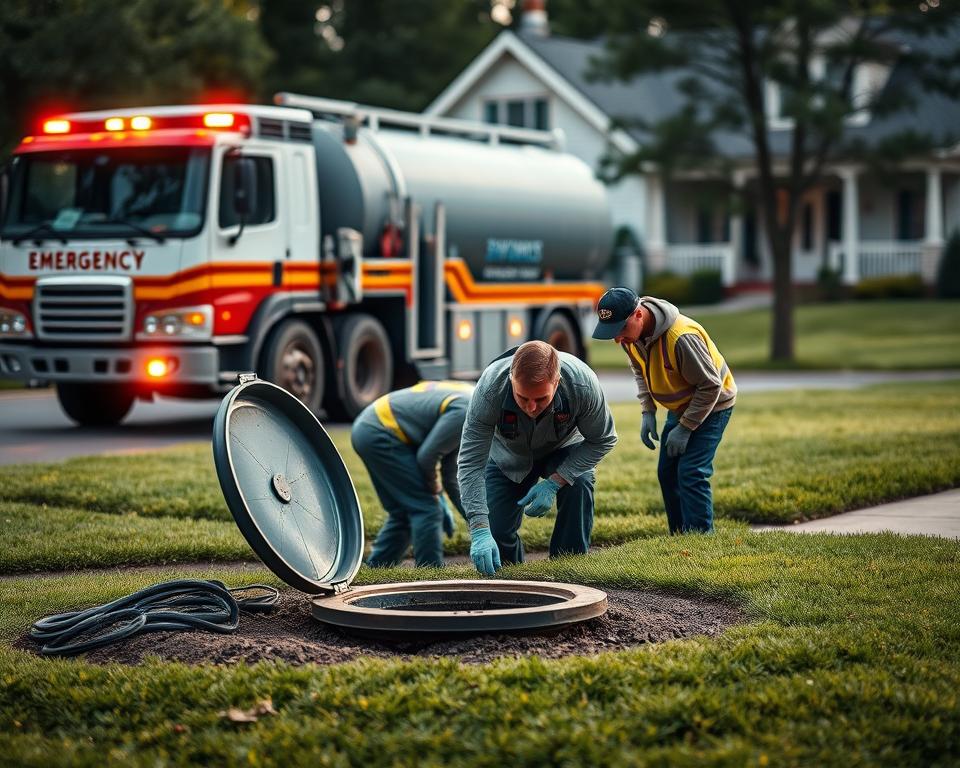Septic System Servicing
Ever wondered regarding the consequences of ignoring septic system maintenance? When you depend on these installations for waste management, foregoing scheduled care can result in hefty bills. It also introduces risks to both well‑being and the ecosystem. Servicing your septic system is far from a simple task; it’s vital for ensuring your residence runs efficiently. By routinely pumping your septic tank, you prevent sludge accumulation and lengthen the longevity of your unit. This forward‑looking stance helps you sidestep any troublesome situations. Learn the value of septic tank maintenance and the steps entailed with septic tank services.
Notable Observations
- Regular septic system pumping is essential for preventing hefty repairs.
- Ignoring maintenance can result in health risks for your family.
- Knowing your septic system aids in proper care.
- Symptoms of a failing septic system should be identified early.
- Licensed technicians can assist in maintaining excellent tank health.
Grasping Your Septic System
A septic system is an effective in‑situ approach for handling wastewater. It mainly consists of two parts: the septic tank and the drainfield. Both are vital for providing adequate purification and preserving the environment.
The septic tank receives wastewater from your home. In it, solids drop to the bottom, and effluent drift to the surface. Bacteria within the tank break down the biomatter, making the effluent simpler to process. This initially processed wastewater then flows to the absorption area for further purification by the soil, completing the treatment.
It’s important for homeowners to appreciate the workings of their septic system. Grasping how the septic tank and leachfield function together can foster better system care. This understanding encourages proper maintenance strategies, ensuring the system’s longevity.

Value of Routine Septic System Cleaning
Routine servicing of the septic system is crucial for home and public health. If neglected, untreated wastewater can seep into your yard. This overflow can cause well water contamination, posing dangerous conditions. By servicing the septic system clean, you protect your loved ones and the community.
It’s recommended to clean the septic system every three to five years, according to how much you rely on it. Such care is not just environmentally wise; it heads off big bills. A septic system that’s well‑maintained works better, delivering a healthier living space and a safer environment.
Warnings Your Septic Tank Needs Attention
Homeowners need to recognize signs that their septic tank may need cleaning. Common indicators to watch for consist of:
- Sluggish water flow in sinks, bathtubs, and loos
- Foul stenches near the leachfield
- Effluent overflows in household plumbing
- Persistent soggy spots or overly green areas of grass on top of the septic system
It’s essential to spot these signs quickly to avoid serious septic tank problems. Regular inspections are essential. They help spot issues before they escalate to pricey restorations. Examining your system regularly ensures it functions well and survives longer.
Keeping watch and moving promptly are key for septic system care. By observing these red flags, you can maintain your septic system in top shape.
Septic System Cleaning Schedule
Pumping your septic system on schedule is fundamental to maintaining your home’s plumbing in good order. Professionals usually suggest cleaning the septic tank every three‑to‑five years. However, this can differ depending on the number of your household, how much usage you have, and the size of your tank.
If you have a larger household that draws more water, you might need to service the system more often. Watching your water consumption can let you determine if you need to adjust your cleaning schedule.
All in Sanitation recommends setting up a steady pumping schedule that suits your household’s particular needs. Adhering to a routine maintenance routine helps keep your septic system operating smoothly and prevents hefty fixes.
Septic System Cleaning: Top Tips
For a septic system to stay robust, homeowners must practice key guidelines. It’s critical not to dispose of non‑biodegradable items; doing so stops blockages and keeps the system functioning properly. Similarly, minimizing harsh chemicals preserves the required bacterial balance. These steps are key for the system’s durability and effectiveness.
Proactivity with scheduled inspections is essential. Setting up periodic checks can catch issues promptly, facilitating immediate fixes. Additionally, conserving water through repairing drips and mindful usage supports septic tank health. These measures make sure the system operates effectively for a long time.
It’s also wise not to park on the leachfield. Leaving this area clear lets it adequately handle effluent, shielding your system from issues. Heeding advice from professionals like All in Sanitation also boosts septic system care.
The Process of Septic Tank Pumping
For homeowners, understanding the septic system service process is key. A licensed septic pumper should handle regular septic tank pumping to keep your system operating properly. The first step is evaluating the tank’s condition to decide when it needs pumping.
A septic tank requires pumping once the sludge take up about one‑third to 50 percent of its capacity. The licensed septic pumper will then extract these deposits. This action preserves the system’s effectiveness. Furthermore, the appointment may involve checking the tank for possible issues, facilitating immediate fixes.
Maintaining a journal of each pumping visit is smart. This log helps homeowners monitor their septic system’s upkeep, and is useful if selling the property. Proper septic system maintenance improves its service life and performance, heading off costly fixes later on.
Septic Tank Check‑Up: What to Look For
Regular inspections are crucial for your septic system’s condition. Using a thorough septic tank inspection checklist can reveal latent issues early. Inspections should be done by a licensed contractor every 1‑2 years. They will measure sludge buildup and the scum thickness during this time.
Inspecting the inlet and outlet baffles and effluent filters is also vital. These elements are critical for your septic system’s proper operation. Spotting seepage or malfunctions early can avoid large repair costs. Forward‑thinking actions, like following an inspection checklist, boost your system’s durability and effectiveness.
Specialized Septic System Services
Using expert septic system services is essential for your septic system’s integrity. By selecting a company like All in Sanitation, you ensure that experts manage the cleaning, check‑ups, and fixes meticulously. Accredited technicians possess special know‑how, helping homeowners to maintain the system’s best functionality for decades.
Maintenance by qualified pros reduces the chance of unexpected malfunctions and hefty repairs. These services include comprehensive inspections that evaluate the system’s state, identifying incipient problems before they escalate. Taking this forward‑looking posture significantly extends your septic system’s service years.
At the end of the day, handing over your septic system to certified pros offers confidence. Working alongside companies such as All in Sanitation taps into their know‑how. It guarantees the health of your tank, fostering trust in its maintenance.
Septic System Maintenance Advice for Homeowners
Homeowners have the ability to maintain their septic systems functioning reliably. Using effective care hints greatly enhances their operation. Making simple changes to how we use water, like cutting down on excess use and staggering the use of appliances, decreases strain on the system.
Adding efficient fixtures in your washrooms and galleys noticeably bolsters septic longevity. These fixtures decrease water use without hurting convenience. Skipping garbage disposals is wise too, as they produce more residue in the system, requiring more frequent upkeep.
Consistent inspections and sticking to a thorough maintenance routine will prolong your septic system’s life. Paying attention of everything that flows into your drains is essential for maintaining a balanced septic environment. By practicing these habits, you’ll immensely benefit your septic system’s operation and longevity.
Common Septic System Repairs
Septic systems may face various problems over time, necessitating repairs. Common faults are seepage, faulty baffles, and percolation troubles in the leachfield. By identifying the warnings early, homeowners can address them quickly, maintaining their system stays in sound condition.
Typical repairs involve:
- Changing out faulty components to re‑establish system integrity
- Fixing or changing cracked conduits to prevent leaks
- Clearing clogged lines to maintain proper drainage
Fixing septic troubles swiftly not only reduces expenses over time but also prolongs the system’s service years. Scheduled check‑ups and maintenance can ward off these complications, aiding in the care of a sound septic system.
Conclusion
Preserving your septic system sound is central to planetary and household well‑being. Routine pumpings and examinations avoid expensive repairs and hazards. Taking initiative with septic care protects time and lowers worry.
Employing experts like All in Sanitation guarantees top‑notch upkeep tailored for your system. Their expertise assists detect issues quickly, preventing significant troubles and highlighting the need for regular inspections.
Adopting best practices for septic maintenance promises long‑term system effectiveness. A small amount of maintenance today ensures a more reliable septic system in the future.

